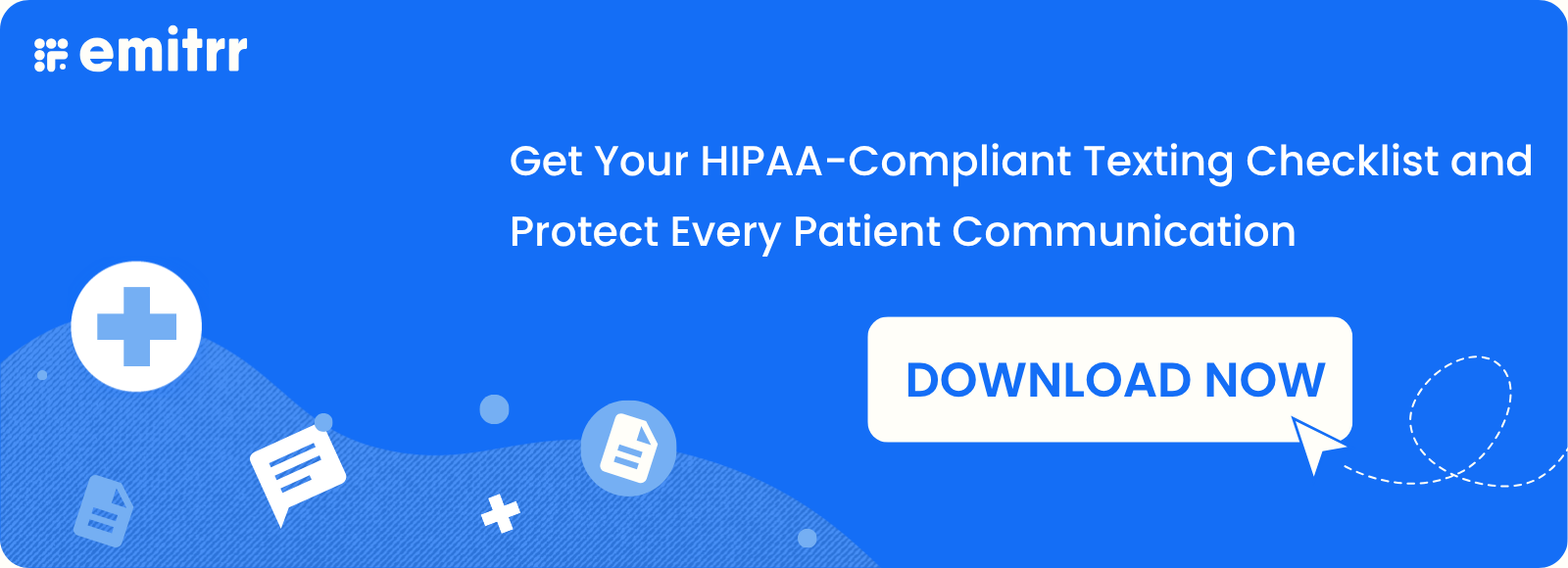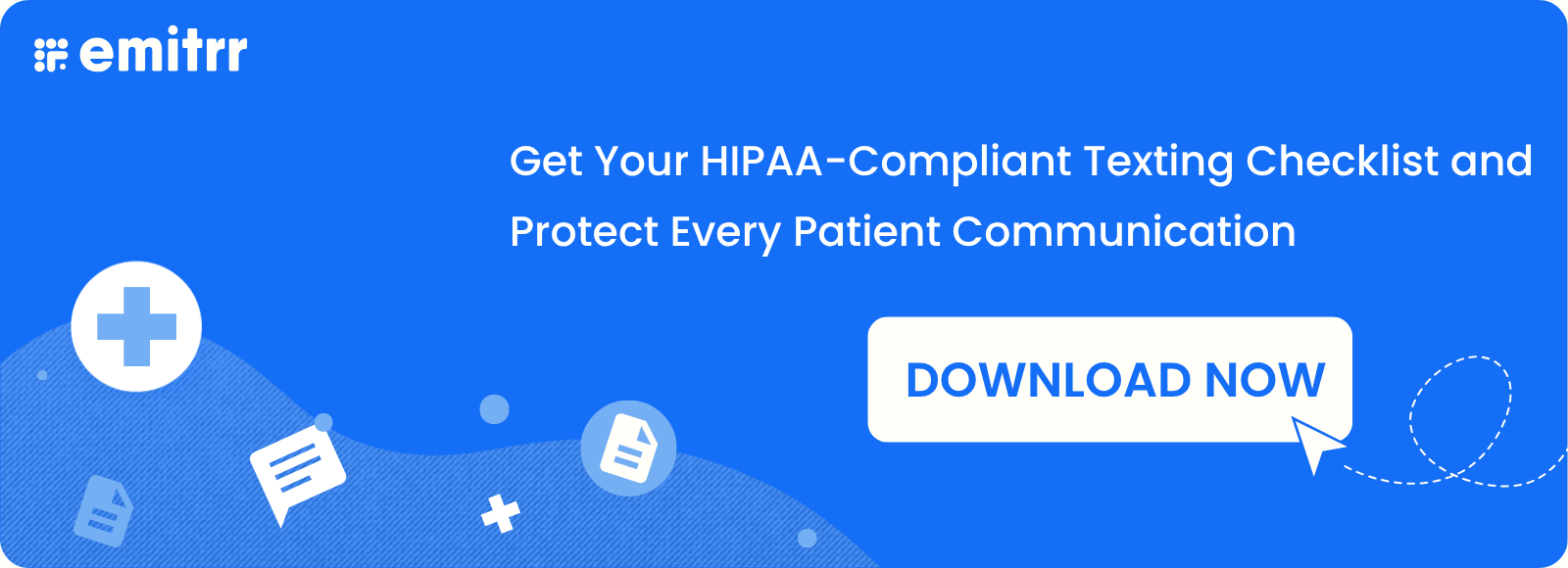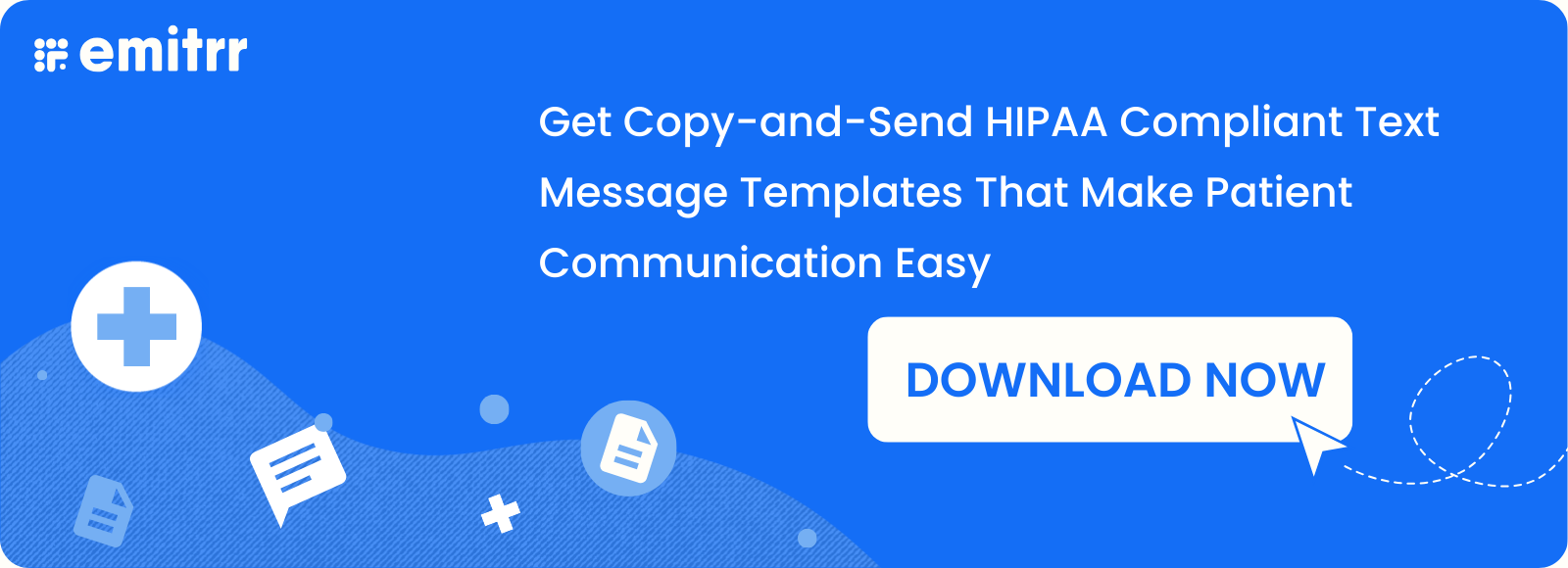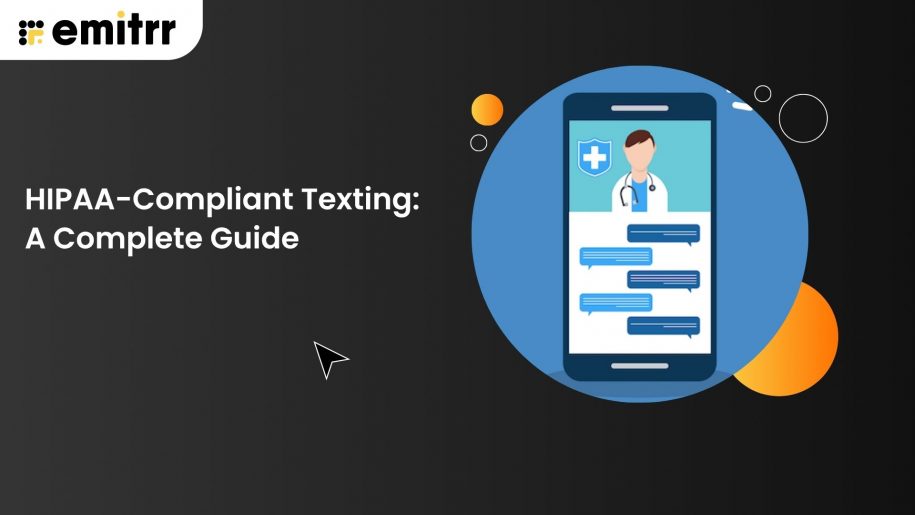Introduction
In today’s fast-paced healthcare environment, a patient wants one thing: speed, convenience, and personal communication. Texting has become the preferred method for practices to confirm appointments, send reminders, and share updates.
But here’s the catch: regular texting is not HIPAA-compliant.
But for healthcare providers, that means traditional SMS could lead to serious privacy risks-and costly violations. The good news? With the right HIPAA-compliant texting platform, you can text patients easily and securely-while staying fully aligned with HIPAA texting compliance requirements.
In this guide, we’ll detail what you need to know about HIPAA-compliant text messaging, why it’s so important, and how Emitrr helps you communicate safely, efficiently, and confidently.
What is HIPAA-Compliant Texting?
Because HIPAA is designed to protect patients’ health information, also known as PHI (Protected Health Information), any communications involving PHI must meet HIPAA’s strict security and privacy standards.
This is what it means: HIPAA-compliant texting, so-called HIPAA-compliant SMS means using a secure healthcare communication system that meets these standards. Such systems enable healthcare professionals to send HIPAA-compliant patient messages without risking the exposure or unauthorized access to patient data.
A HIPAA-compliant text messaging solution ensures:
- Encryption of messages in transit and at rest
- Access control ensures only authorized users can view the messages.
- Audit logs to track who sent, received, or accessed each message
- Safe storage and backups, to prevent data from being lost or tampered with
In short, it’s texting, but done safely with HIPAA-compliant communication software built right in.
Before we deep dive into HIPAA-compliant texting, check out this explainer video:
HIPAA-Compliant Texting vs. Standard Messaging
| Aspect | HIPAA-Compliant Texting | Standard Text Messaging |
| Encryption | End-to-end encrypted | Usually unencrypted |
| Access Control | Role-based user permissions | No access restrictions |
| Audit Trails | Tracks message history and activity | No tracking capabilities |
| Data Storage | Secure cloud or on-premises servers | Stored on personal devices |
| PHI Protection | Meets HIPAA standards | Not compliant with HIPAA |
| BAA (Business Associate Agreement) | Required between the provider and the vendor | Not available |

Why Regular Texting Isn’t HIPAA-Compliant
Traditional SMS and consumer messaging apps, though convenient, are not considered HIPAA-compliant communication tools.
Here’s where they fall short:
- No encryption: Standard SMS messages travel in plain text and can be intercepted.
- No control of access: Messages can appear on unlocked phones or be easily forwarded.
- No audit trail: You can’t track who viewed or deleted a message.
- No BAA: Vendors like mobile carriers won’t sign a Business Associate Agreement, a necessity to be compliant with HIPAA.
Example of a violation:
A staff member texts out lab results using their personal phone. The message gets sent to the wrong number — that’s an immediate HIPAA texting breach.
Consequences of HIPAA violation:
HIPAA violation penalties range from $100 up to $50,000 per incident. But the consequences can also include loss of reputation and patient trust.
Read more: HIPAA-Compliance Rules, penalties, & Violations
Benefits of HIPAA Compliant Texting
HIPAA-compliant text messaging in healthcare is not just about avoiding fines; it’s about secure patient texting, operational efficiency, and trust. It revolutionizes the way staff and patients communicate.
Faster, More Reliable Patient Communication
You can, with HIPAA-compliant two-way texting:
- Send HIPAA-compliant appointment reminders instantly
- Notify patients about schedule changes securely
- Communicate follow-ups and instructions without calls
This form of secure communication for doctors and patients improves response rates and saves administrative hours.
Improved Patient Experience and Satisfaction
With HIPAA-compliant communication, you not just ensure security but also improve patient experience and satisfaction. Patients crave convenience. Secure healthcare texting offers that, with privacy intact:
- Patients can respond at their convenience.
- PHI remains protected.
- Building patient trust and loyalty
Let your patients feel safe and connected with Emitrr’s HIPAA-compliant messaging solution.
Fewer No-Shows, Higher Efficiency
Automated HIPAA-compliant reminders drastically reduce no-shows.
Users of Emitrr report a decrease in missed appointments of up to 50% and an increase in follow-up responses by 40%, all due to HIPAA-compliant communications tools.
More Productive Staff
Automate repetitive tasks, such as:
- Appointment confirmations
- Payment notifications
- Review requests
Your team saves time, enhancing secure healthcare communication throughout workflows.
Reduced Risk, Greater Peace of Mind
Every message is encrypted and logged, and Emitrr’s signed BAA covers all compliance. This totally eliminates any chances of non-compliant texting or breach in HIPAA text message policy.
Scalable for Growth
Whether you are a solo practice or a multi-location network, HIPAA-compliant texting platforms like Emitrr grow with you to support consistent, compliant, and secure communication at scale.

Use Cases for HIPAA-Compliant Text Messaging
HIPAA-compliant patient messaging supports each step of the care journey:
Appointment Scheduling & Reminders
Automate Confirmations: “Hi Sarah, your appointment is on Monday at 3 PM. Reply C to confirm or R to reschedule.”
No more no-shows with Emitrr’s HIPAA-compliant appointment reminders.
Two-Way Patient Communication
Answer patient questions securely through HIPAA-compliant two-way texting, keeping all PHI protected.
Follow-ups after the visit
Send HIPAA-compliant patient messages like:
“Hope you’re feeling better after your visit. Need anything?”
Billing & Payment Notifications
Send payment alerts and invoices with HIPAA-compliant SMS and achieve compliance while improving cash flow.
Feedback & Reviews
Emitrr automates HIPAA-compliant review requests and amplifies your online reputation safely.
Internal Staff Messaging
Permit secure communication for doctors and staff to keep in touch effectively without using personal phones.
Preventive Care & Recall Campaigns
Run compliant outreach campaigns to improve retention and promote preventive care, fully encrypted and consent-based.
Each of these use cases relies on clear, well-written patient messages that follow HIPAA guidelines. Having standardized, HIPAA-safe text messages for common scenarios helps teams communicate consistently without risking patient privacy.
Get free HIPAA-compliant text message templates.

How to Implement HIPAA-Compliant Texting in Your Practice
Wondering how to send HIPAA-compliant text messages? Here’s how:
Step 1 – Assess Current Channels: Audit all messaging tools for HIPAA compliance gaps.
Choose a Secure Platform: Select a text messaging app that is HIPAA-compliant. Examples include Emitrr, which provides encryption, audit trails, and a signed BAA. Here’s a short explainer video on how you can choose the right hIPAA-compliant texting app for your practice –
Step 2 – Train Your Staff: Teach best practices for secure patient texting and PHI handling.
Establish clear policies on what is permitted and what is not under your HIPAA text message policy.
Step 3 – Obtain Patient Consent: Always get written or digital consent for HIPAA-compliant texting.
Step 4 – Monitor Regularly: Conduct HIPAA compliance audits and ensure compliance remains intact.
Following these steps will keep you compliant with HIPAA while improving patient engagement and operational efficiency.
Common Myths About HIPAA-Compliant Texting
Myth 1: “WhatsApp or iMessage are HIPAA compliant.”
They’re not-no BAA, no audit logs, no PHI safeguards.
Myth 2: “HIPAA compliant texting is too expensive.”
Emitrr has affordable HIPAA-compliant text messaging to help save money in the long run by avoiding fines and increasing retention.
Myth 3: “Only large hospitals need HIPAA-compliant messaging.”
HIPAA applies to all providers handling PHI, even small clinics.
Myth 4: “HIPAA-compliance slows communication.”
Actually, communication software that is HIPAA-compliant, like Emitrr, automates tasks and speeds things up.
Myth 5: “Patients don’t care.”
Patients appreciate privacy. Secure patient texting engenders confidence and long-term loyalty.
Frequently Asked Questions
HIPAA-compliant texting refers to sharing PHI via text by covered entities without violating HIPAA rules and regulations. The Health Insurance Portability and Accountability Act outlines certain rules pertaining to the usage and disclosure of sensitive patient information and mandates all healthcare organizations or covered entities to abide by the same. Any non-compliance can invite legal action for those involved.
To ensure and practice HIPAA-compliant messaging, covered entities must use secure text messaging to share PHI with their patients. They must also ensure the implementation of the necessary physical, technical, and administrative safeguards to prevent any unauthorized access.
If you transmit any PHI to your patient via text without ensuring the implementation of necessary safeguards, then you can be questioned for the same. If any non-compliance is found, you are required to pay hefty fines and even face legal action depending on the degree of HIPAA violation.
A chat can be considered HIPAA compliant when there are secure logins and access controls in place.
No. It is always important to get the explicit consent of patients before sending them text messages. It is a part of HIPAA compliance. You need to communicate the risks associated with sharing information via text, such as interception during transit, lost or stolen devices, or unauthorized access.
Yes, but as long as the platform you are using is HIPAA-compliant and the patient has provided informed consent.
Encryption, access control, secure storage, and a signed BAA between the healthcare provider and the texting vendor.
Yes, sending appointment reminders is permitted under HIPAA regulations only if they don’t reveal sensitive PHI and are sent through a secure platform.
The key difference between secure messaging and texting is that secure messaging happens within a protected app or platform, while standard texting uses open networks that are not encrypted.
Yes, signing a Business Associate Agreement ensures that your vendor is legally responsible for maintaining HIPAA compliance.
HIPAA violations can lead to hefty fines, depending upon the extent of the breach, along with damaging your reputation.
Yes, if they initiate contact, they can include PHI, but you need to be careful as your responses must still follow HIPAA guidelines.
Not really, as WhatsApp, iMessage, or Facebook Messenger are not HIPAA-compliant and do not provide BAAs.
When it comes to the features offered by a HIPAA-compliant texting platform, here are a few key features you need to look for such as encryption, secure login, message tracking, audit logs, access control, and data retention policies.
Training staff on HIPAA is a vital part of complying with HIPAA; hence, you need to provide regular training on what counts as PHI, how to use secure tools, and what to avoid in text communication
Conclusion
Protecting the rights of the patients and safeguarding their personal information is as important as delivering exceptional care. Any negligence on that front not only attracts legal troubles but also breaks the trust between you and your patients. HIPAA-compliant texting with patients is the way forward if you want to offer the best possible care to them, while also ensuring that their PHI doesn’t get into the hands of unauthorized individuals. Invest in a HIPAA-compliant messaging app like Emitrr to enhance patient engagement and experience. Book a demo here to see what Emitrr has in store for you.

 4.9 (400+
reviews)
4.9 (400+
reviews)
